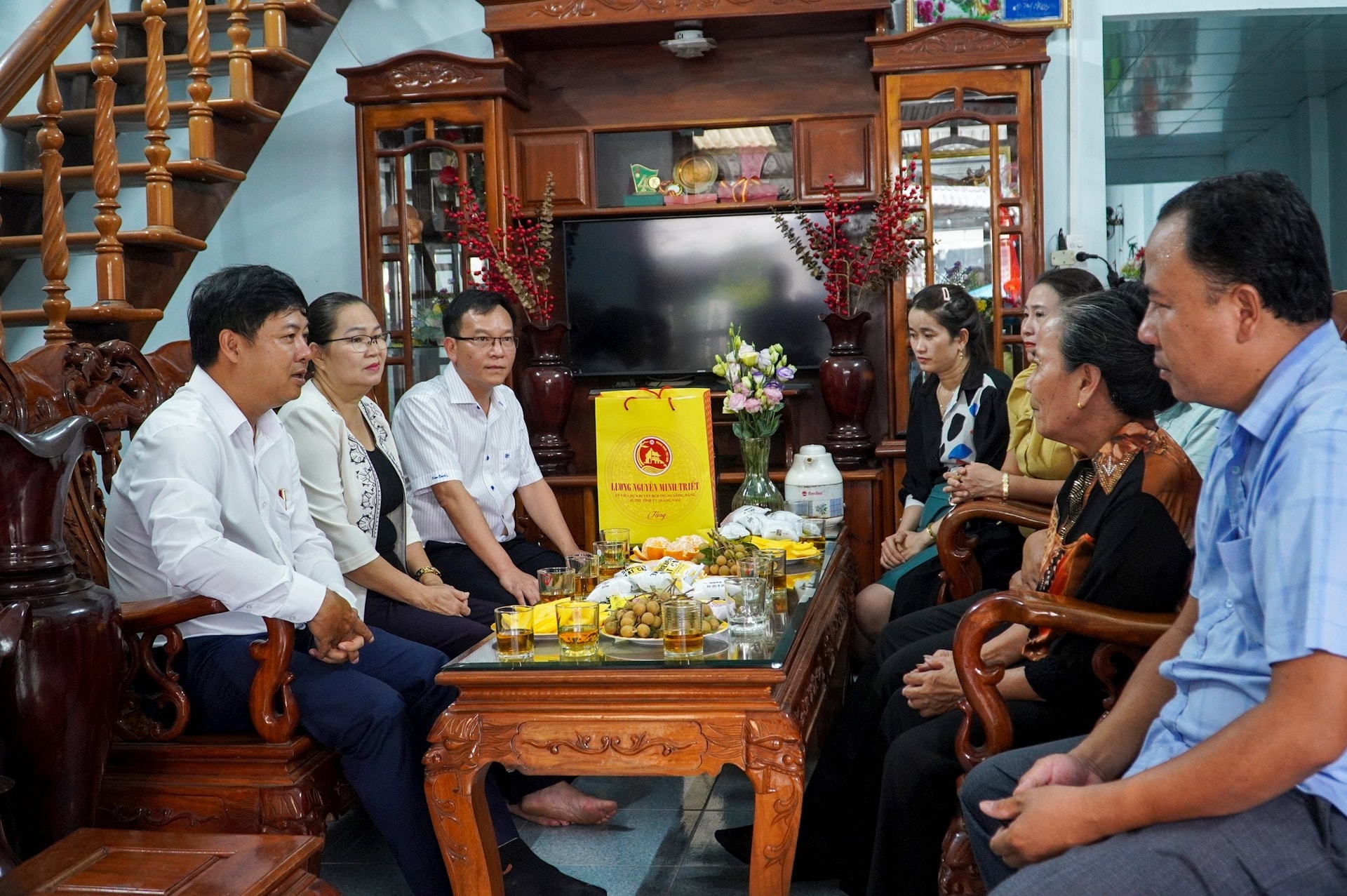
A time of volunteerism
After the complete liberation of the country, Ms. Nguyen Thi Manh (born in 1938, from Ha Nam province) decided to settle in Dai Hong (Dai Loc) - a place where she had left her footprints on her journey to pursue revolutionary ideals.
Today, the war wounds etched on her body continue to erode her health, making daily activities and mobility difficult. But for her, each wound is a part of her heroic memories, linked to her proud journey of volunteering.
Ms. Manh was born into a family with a revolutionary tradition. Her home in Ha Nam province was once a secret base for pre-revolutionary cadres and soldiers fighting against the French. From a young age, she was imbued with patriotism and harbored a desire to contribute to the revolution.
At the age of 16, responding to the "All for the Dien Bien Phu Campaign" movement, she and her peers enthusiastically joined the army. Assigned as a "cook" in the unit, she quickly adapted to the harsh cooking conditions in the trenches.
“I heard from my elders that in the early stages of the campaign, the cooks had to bring rice from the rear to ensure the soldiers had enough to eat while fighting the enemy. Setting up a kitchen was very difficult; they had to use dry firewood to burn, then take turns fanning to disperse the smoke, to avoid detection and artillery fire from the enemy. Many times, the rumbling of bombs sent rice and pots flying everywhere… Since the invention of the Hoang Cam stove, the cooks dug the stove right next to the gun bunker, allowing them to cook hot rice every day,” Mrs. Manh recounted.
Digging the Hoàng Cầm kitchen was Mrs. Mạnh's first lesson in the war-torn Điện Biên. "The kitchen was dug with many trenches to allow smoke to escape. Even when the fire was lit during the day, the smoke dissipated quickly, so enemy planes scouring overhead couldn't detect it," she shared.
During a food delivery, Mrs. Manh stepped on a landmine planted by the enemy, leaving her body covered in wounds. Although she was transferred to the rear for treatment, every time she heard the sound of bombs falling and bullets exploding, her heart ached with worry for her comrades. Before she had fully recovered, she requested to return to the trenches, continuing to fight alongside her unit.
Meanwhile, Mrs. Hoang Thi Mieu (born in 1938, from Hai Huong, currently living in Dai Hong commune, Dai Loc district) shared that she went to the Dien Bien Phu battlefield when she was only 16 years old. On her first day in the unit, she was assigned to assist the medical corps in providing first aid. Despite her small stature, she was brave and quick-witted. Whenever there was news of wounded soldiers, she would sneak through the trenches to bring the injured to the rear for treatment.
Out of compassion for the wounded soldiers, covered in blood and mud, Mrs. Mieu assisted the military medics in providing initial first aid. Many regained consciousness after surgery, and she lovingly comforted them, cared for them, and fed them spoonfuls of porridge.
The cheerful and witty young volunteer Hoang Thi Mieu often cracked jokes to ease the pain of the wounded soldiers. The efforts of military medical personnel like her saved countless young soldiers from the brink of death, helping them regain their health and continue fighting.
Nostalgia for loved ones
When moving from Tam Son commune to Tam Xuan 1 commune (Nui Thanh district), Mrs. Nguyen Thi Van brought with her the documents, medals, and the "Recognition of Service to the Fatherland" of her uncle, martyr Nguyen Quan, to worship. That's the little information she has about martyr Quan, from the day he joined the revolution in 1941.
Ms. Vân said that after the country was completely liberated (in 1975), the family received the death certificate. The certificate clearly stated that Mr. Nguyễn Quận participated in the Điện Biên Phủ campaign as a squad leader and died on May 7, 1954.
The greatest honor for the family is the First Class Victory Medal posthumously awarded by the Government for achievements in the resistance war against the French. The medal was signed by the Minister of National Defense on March 18, 1958.
To this day, 71 years after the great victory of the Dien Bien Phu campaign, Mrs. Van's family still does not know where the martyrs' graves are located, having only set up an altar at home.
"The family earnestly hopes that the Party and the State will pay attention to and provide information about the burial place or the repatriation of martyr Nguyen Quan. If he has not yet been repatriated, we hope the State will continue the search so that the family can have peace of mind," Mrs. Van expressed her hope.
Martyr Phan Duc Huong was the paternal uncle of Mr. Phan Duc Bon (Binh Duong commune, Thang Binh district). To this day, information about the martyr is limited to the death certificate sent by the State in 1975. Martyr Phan Duc Huong was born in 1927, enlisted in August 1947; at the time of his death, he held the rank of Squad Leader, belonging to Regiment 84; he died on June 15, 1953, at Dien Bien Phu.
“Over the years, the families of fallen soldiers have received full attention and care from the Party and the State. But the biggest concern is that the family has not yet found the remains. For more than 50 years, I have been worshipping them at home and longing for the day when I can bring the fallen soldier back to his hometown,” Mr. Bon shared.
Source: https://baoquangnam.vn/nho-thang-5-dien-bien-3154221.html







![[Photo] General Secretary To Lam attends the inauguration ceremony of Si Pa Phin multi-level boarding school.](/_next/image?url=https%3A%2F%2Fvphoto.vietnam.vn%2Fthumb%2F1200x675%2Fvietnam%2Fresource%2FIMAGE%2F2026%2F01%2F31%2F1769840655651_ndo_br_z7486540481209-f37c7e00a962aec2a061c64b7db569ef-jpg.webp&w=3840&q=75)













































































![OCOP during Tet season: [Part 3] Ultra-thin rice paper takes off.](/_next/image?url=https%3A%2F%2Fvphoto.vietnam.vn%2Fthumb%2F402x226%2Fvietnam%2Fresource%2FIMAGE%2F2026%2F01%2F28%2F1769562783429_004-194121_651-081010.jpeg&w=3840&q=75)


![OCOP during Tet season: [Part 2] Hoa Thanh incense village glows red.](/_next/image?url=https%3A%2F%2Fvphoto.vietnam.vn%2Fthumb%2F402x226%2Fvietnam%2Fresource%2FIMAGE%2F2026%2F01%2F27%2F1769480573807_505139049_683408031333867_2820052735775418136_n-180643_808-092229.jpeg&w=3840&q=75)





Comment (0)